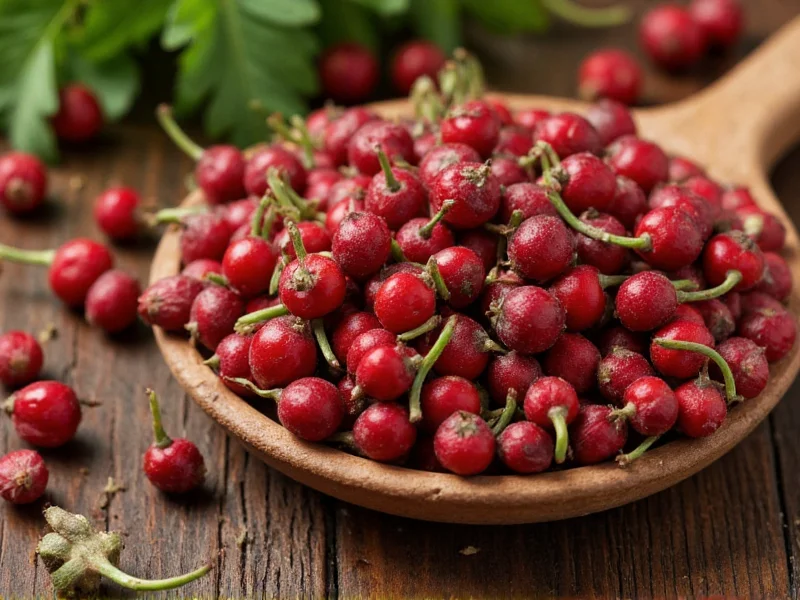When you're in the middle of preparing a recipe and realize you've run out of ground cloves, knowing reliable alternatives can save your dish. Cloves offer a distinctive warm, sweet, and slightly peppery flavor with aromatic notes that are difficult to replicate exactly, but several common spices can effectively stand in when needed.
Understanding Cloves and Their Unique Flavor Profile
Ground cloves come from dried flower buds of the Syzygium aromaticum tree and deliver a potent, warm, sweet-spicy flavor with subtle citrus and peppery notes. Their intense aroma makes them a key ingredient in many spice blends, baked goods, and savory dishes across various cuisines. Because of their strong flavor, cloves are typically used in small quantities—usually ¼ to ½ teaspoon per recipe.
Top 6 Ground Cloves Substitutes Ranked by Effectiveness
Not all substitutes work equally well in every recipe. Here's how the most common alternatives compare for different culinary applications:
| Substitute | Best For | Substitution Ratio | Flavor Notes |
|---|---|---|---|
| Allspice | Baking, mulled beverages, spice rubs | 1:1 | Warm, complex flavor combining notes of cinnamon, nutmeg, and cloves |
| Pumpkin Pie Spice | Baking, desserts, autumn recipes | 1:1 | Contains cloves plus cinnamon, ginger, nutmeg—slightly sweeter profile |
| Cinnamon | Baking, oatmeal, fruit dishes | ½-¾ amount of cloves | Sweeter, less peppery—adds warmth without intense clove flavor |
| Nutmeg | Béchamel sauces, mashed potatoes, baked goods | ½ amount of cloves | Warmer, earthier profile—use freshly grated for best results |
| Cardamom | Savory dishes, rice pilafs, Middle Eastern cuisine | ⅔ amount of cloves | Floral, citrus notes—works well in meat dishes and stews |
| Mace | Custards, light-colored sauces, delicate dishes | 1:1 | Milder cousin of nutmeg with subtle clove-like warmth |
How to Choose the Right Substitute for Your Recipe
Selecting the best ground cloves alternative requires considering your specific dish. For baking applications like gingerbread, pumpkin pie, or spiced cakes, allspice provides the closest flavor match at a 1:1 ratio. This versatile spice blend works particularly well as a ground cloves substitute in baking recipes where the distinctive clove flavor isn't the star but contributes to the overall spice profile.
When substituting cloves in savory dishes such as curries, stews, or meat rubs, cardamom often delivers superior results. Use approximately two-thirds the amount of cardamom compared to the cloves called for in your recipe. Cardamom's complex flavor profile includes citrus and floral notes that complement rather than overpower other ingredients—a crucial consideration when finding alternatives for ground cloves in savory applications.
Precise Substitution Ratios for Common Recipes
Getting the measurements right matters when replacing ground cloves. Too much substitute can overwhelm your dish, while too little leaves it lacking depth. Here are specific recommendations for popular recipes:
- Pumpkin pie: Replace ½ tsp ground cloves with ½ tsp pumpkin pie spice or ¼ tsp allspice
- Gingerbread: Substitute ¼ tsp cloves with ⅛ tsp nutmeg plus ⅛ tsp cinnamon
- Mulled wine: Use ½ tsp allspice for every ¼ tsp cloves called for
- Beef stew: Replace ¼ tsp cloves with ⅛ tsp cardamom plus a pinch of cinnamon
- Apple pie: Substitute ¼ tsp cloves with ⅛ tsp nutmeg plus ⅛ tsp allspice
Common Mistakes to Avoid When Substituting Ground Cloves
Many home cooks make critical errors when searching for ground cloves replacement options. The most frequent mistake involves using too much substitute spice, resulting in an unbalanced flavor profile. Remember that cloves have an intense flavor, so most substitutes should be used more sparingly.
Another common issue occurs when substituting in recipes where cloves play a starring role rather than a supporting one. In dishes like Indian garam masala or certain Chinese five-spice variations where cloves are primary ingredients, no substitute will perfectly replicate the flavor. In these cases, consider whether the recipe can be modified or if it's worth acquiring proper ground cloves.
When working with ground cloves alternatives in baking, always add the substitute gradually and taste as you go. Baking is less forgiving than cooking when adjusting spices, so precise ground cloves substitution ratios become especially important for successful results.
Creating Your Own Custom Spice Blends as Clove Substitutes
For the most tailored ground cloves replacement, consider making small custom blends. Combine equal parts cinnamon and nutmeg with half as much allspice to create a versatile substitute that works well in most baking applications. For savory dishes, blend cardamom with a touch of cinnamon and black pepper to mimic cloves' warm, slightly peppery profile.
When exploring ground cloves substitute options for holiday baking, try mixing ½ teaspoon cinnamon, ¼ teaspoon nutmeg, and ¼ teaspoon allspice to replace ½ teaspoon of ground cloves. This combination delivers the warm spice notes essential to seasonal recipes without the distinctive clove flavor that might be missed by most diners.
When to Skip Substitution Altogether
While effective ground cloves alternatives exist, some recipes simply won't work without authentic cloves. Traditional speculaas cookies, certain Indian biryanis, and classic Chinese braised dishes rely on cloves' unique flavor profile. In these cases, the best approach might be adjusting your menu rather than forcing a substitution that alters the dish's essential character.
Consider whether your recipe genuinely requires cloves or if they're playing a supporting role. Many modern interpretations of traditional recipes have been adapted to work without hard-to-find ingredients, providing legitimate alternatives to ground cloves in specific culinary contexts.











 浙公网安备
33010002000092号
浙公网安备
33010002000092号 浙B2-20120091-4
浙B2-20120091-4